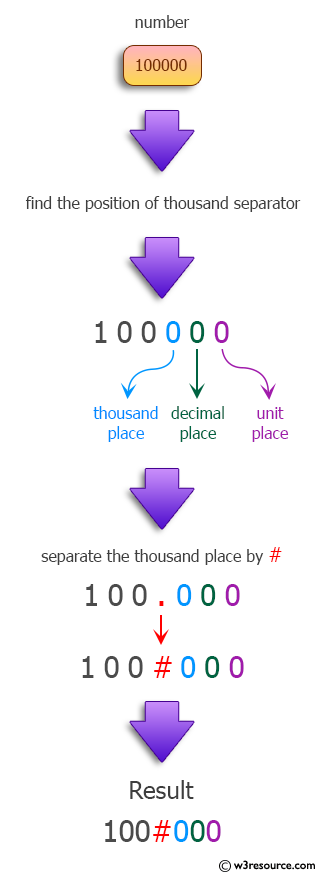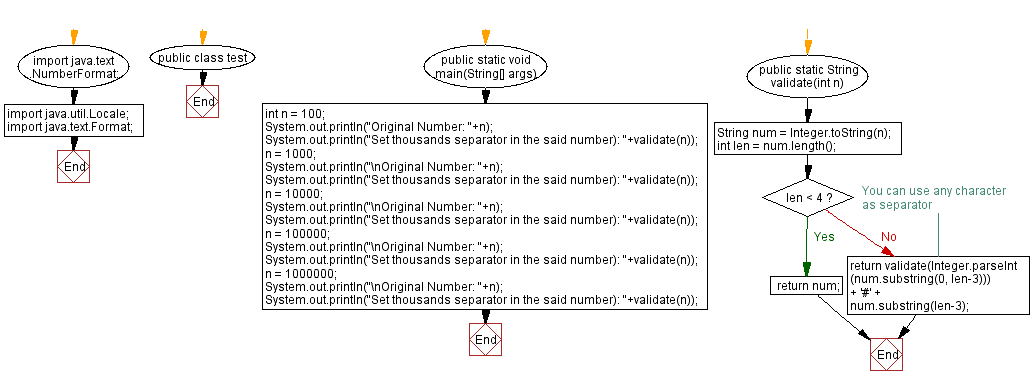Java programming Exercises: Set thousands separator in the said number
Java Regular Expression: Exercise-20 with Solution
Write a Java program that takes a number and set thousands separator in that number.
Sample Solution:
Java Code:
import java.text.NumberFormat;
import java.util.Locale;
import java.text.Format;
public class test {
public static void main(String[] args) {
int n = 100;
System.out.println("Original Number: "+n);
System.out.println("Set thousands separator in the said number): "+validate(n));
n = 1000;
System.out.println("\nOriginal Number: "+n);
System.out.println("Set thousands separator in the said number): "+validate(n));
n = 10000;
System.out.println("\nOriginal Number: "+n);
System.out.println("Set thousands separator in the said number): "+validate(n));
n = 100000;
System.out.println("\nOriginal Number: "+n);
System.out.println("Set thousands separator in the said number): "+validate(n));
n = 1000000;
System.out.println("\nOriginal Number: "+n);
System.out.println("Set thousands separator in the said number): "+validate(n));
}
public static String validate(int n) {
String num = Integer.toString(n);
int len = num.length();
if(len < 4) {
return num;
}
//You can use any character as separator
return validate(Integer.parseInt(num.substring(0, len-3))) + '#' + num.substring(len-3);
}
}
Sample Output:
Original Number: 100 Set thousands separator in the said number): 100 Original Number: 1000 Set thousands separator in the said number): 1#000 Original Number: 10000 Set thousands separator in the said number): 10#000 Original Number: 100000 Set thousands separator in the said number): 100#000 Original Number: 1000000 Set thousands separator in the said number): 1#000#000
Pictorial Presentation:

Flowchart :

Java Code Editor:
Contribute your code and comments through Disqus.
Previous: Remove the specific letters from a string and return the new string.
Next: Remove all non-alphanumeric characters from a given string.What is the difficulty level of this exercise?
Test your Programming skills with w3resource's quiz.
Java: Tips of the Day
What is the best way to filter a Java Collection?
Java 8 (2014) solves this problem using streams and lambdas in one line of code:
List<Person> beerDrinkers = persons.stream()
.filter(p -> p.getAge() > 16).collect(Collectors.toList());
Use Collection#removeIf to modify the collection in place. (Notice: In this case, the predicate will remove objects who satisfy the predicate):
persons.removeIf(p -> p.getAge() <= 16);
lambdaj allows filtering collections without writing loops or inner classes:
ListbeerDrinkers = select(persons, having(on(Person.class).getAge(), greaterThan(16)));
Ref: https://bit.ly/3uwYid6
- New Content published on w3resource:
- HTML-CSS Practical: Exercises, Practice, Solution
- Java Regular Expression: Exercises, Practice, Solution
- Scala Programming Exercises, Practice, Solution
- Python Itertools exercises
- Python Numpy exercises
- Python GeoPy Package exercises
- Python Pandas exercises
- Python nltk exercises
- Python BeautifulSoup exercises
- Form Template
- Composer - PHP Package Manager
- PHPUnit - PHP Testing
- Laravel - PHP Framework
- Angular - JavaScript Framework
- Vue - JavaScript Framework
- Jest - JavaScript Testing Framework
